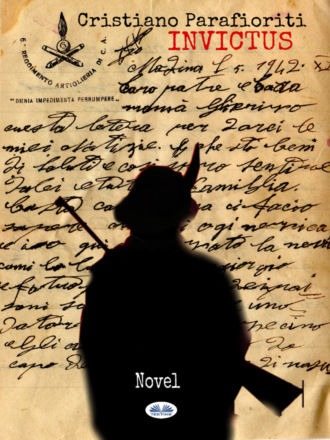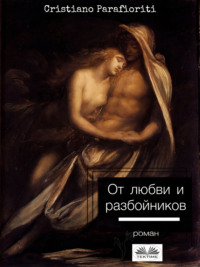
Полная версия
Invictus
“It means you really love me! So I’m not wrong in loving you too!”
And it was true. Digging into his soul, Ture Pileri felt he loved Rosa more than his own life, and yet, from that moment on, ironically, he had to learn to love his life more.
If he wanted to reclaim Rosa on his return, he could only do so with his life on him. So he agreed that, when the impetus to live on the front line was gone, the thought of Rosa waiting for him would give him strength. She was the path and the light that would never let him lose hope.
However, the second to last evening, Zi Peppe surprised his son, telling him they were leaving for Troina at dawn.
Some farmers, who were also travelling to the inland parts of Sicily, had suggested they joined them in making the journey. First skirting the heights of Serra Corona and then cutting across the mule track that, passing through the Mangalaviti woods, wedged between Serra del Re and Pizzo Cannella. From there, they would easily reach Cesarò and then the road to Troina. So they would have left a day early, but at least they wouldn't have had to walk alone along that rough and difficult path.
Ture understood his father’s good intentions but, by doing so, he would never see Rosa again, who was obviously unaware of his early departure. He, therefore, sent an embassy to Concetta to tell Rosa of his sudden departure. His sister reassured him, but Ture’s soul was sad to the core.
The farewell was imminent.
VII
At dawn, as planned, the farmers, who had agreed to make the journey together with Peppe and Ture Pileri, reached the houses of San Giorgio, and from there, the caravan set off towards the province of Enna, crossing the Nebrodi along paths and mule tracks.
After leaving part of the travellers in Cesarò, father and son reached the farmhouse of Lord Solima in Troina before nightfall. Mindful of his friendship with Zi Peppe, Lord Solima welcomed Ture with open arms, knowing that the young man would leave without delay as soon as the municipal messenger arrived for the new notification.
So, a few days later, when the messenger La Pinta arrived in San Giorgio, Zi Peppe, honouring his word, told him the address of Lord Solima’s house in Troina.
It was over: they would have found him, but he would have spared his son Ture at least a month of war, or maybe more. When the town clerk left, Zi Peppe shook his head, dejected: he had done all he could. Then he stretched himself tightly on his chair and kept to himself without speaking.
Za Nunzia approached him, gave him some water, and put her hand on his shoulder: it was a way to sympathize with her husband. She wanted to make him feel all the love she still had for him, for that man who had always devoted himself body and soul to his large family.
“And now what? What will happen to my brother?” Concetta asked.
“He’ll be in Troina for a while,” her father answered. “When they find him, he will have to go off to war, my poor son!”
Nunzia burst into a sob. The idea of losing her son forever was now being fulfilled in all its cruelty. Ture had been her first-born child, the fruit of the first night of love, and now the greatest fear of a mother was coming true.
Until the day before, she had tried to exorcise that moment, but now, as she watched Zi Peppe locked up in a pain that did not belong to him, her emotional defences had melted like ice in the sun. So Nunzia collapsed with a crash. She threw herself to the ground and stayed there, so much so that Zi Peppe and Concetta struggled to get her up. She looked like a rag that had slipped off a chair.
Their daughter took care not to let the other children notice her in that state. She poured some water into a basin, washed her face and dried it, then helped her to pull herself together.
Nunzia stood up and tried to collect herself, clinging to the young woman. Finally, she disappeared among the dishes and began to prepare lunch.
In the afternoon, Concetta and Sina helped their mother mend some sheets. There was no money to buy new ones. Moreover, because of the war, the village haberdasher’s had not been supplied for a long time, the peddlers no longer came by, and everything had to be saved: needles, thread, buttons. Only thoughts and sighs had no price or end.
Now and then, Concetta, the oldest of the daughters, would look up at her mother in the hope of seeing whether that distressing moment had passed. So, as soon as she noticed she was calmer, she stopped patching and, without explanation, walked alone down the road to San Basilio.
When she arrived near Duca’s house, Concetta heard the cheerful voice of Zi Nunzio, who was sitting outside, joyfully singing a ballad with his accordion. He greeted his niece without stopping to play and sing, and the girl sat down next to him to listen to him out of respect and because she was enjoying it.
After a few minutes, Rosa emerged from inside the house. Without being noticed, she remained silent for a while behind the two. Then she approached Concetta and laid a hand on her shoulder. When the eyes of the two cousins met, Concetta immediately realised that this time not even Zi Duca’s accordion could bring a smile or a moment of distraction.
They withdrew near the walnut tree. Rosa could hardly contain her excitement. Concetta, having made sure they were away from prying eyes, embraced her tenderly.
“I’ve wiped away too many tears today, and I don't want to see any more! I just wanted to tell you that Ture is already in Troina. He had to leave suddenly at dawn with a group of farmers. He sent me to inform you. He couldn’t tell you before because he found out last night.”
Rosa looked away from her cousin, trying to hold back her tears, but she failed. Then Concetta, who was very sharp despite her young age, spoke out.
“Stop it! You and my mother are already having a funeral for my brother! Pull yourself together! Ture is tough. You don’t know him well, but he’ll put one hell of a fight.”
“I know, Concetta, but what can I do? I can’t get over it.” Then, in a more relaxed manner, she continued.
“The other day, at the trough, he started making the sound of the little dove. He also told me about your discussion afterwards about the lizard…”
Rosa smiled and Concetta, seeing her relieved, let her continue.
“In the end, you see, it didn’t take me long to get caught!”
“You know, Rosa, you shouldn’t be surprised that Ture told me everything. We always tease each other, but we have a special bond. We’ve grown up together, sharing the challenges of a family that has gradually grown. There were so many mouths to feed that we rolled up our sleeves while we were still children.
The funny thing was that he had never come with me to the trough to fill the pitchers, and I mean never! I don’t think it was because of laziness. It was because the women of the house went there in the afternoons when he was in the fields or with the animals. That evening I noticed that water was scarce and, to avoid a scolding from my mother, I decided to go a little later than usual. Just think how things turn out sometimes! I even thought he was doing it for Lia, I was almost sure of it, but instead, you startled him. Now I can tell you: you’ve caught him off guard. Already on the way back, he seemed to have lost his mind. I know everything about what happened afterwards. He told me.”
Rosa blushed. Concetta’s words had moved her, and most of all, she felt less alone.
The two cousins said goodbye, not before casting a smiling glance at Zi Duca, who, throughout their chat, had not stopped singing and playing. Christmas was approaching, and the old man finally started singing Pastureddi3.
Concetta, on her way back home, on the notes and words of that pastoral that were gradually fading away, thought of her brother and wondered if he would have come back at least for Christmas!
Two days after the start of the Novena, a letter from Ture arrived at Zi Strino’s shop. He had sent it by post, fearing that it would fall into dangerous hands and not trusting it to be delivered through some shepherd crossing the mountain from one side to the other.
Ture reassured everyone about his condition and how Lord Solima treated him like a son, but he also wrote that he would certainly not be returning for the holidays, unfortunately.
Many other young men hid in Solima’s house, he was able to draw cheap labour from them, and the boys could put the war aside for a while. It suited everyone. The fascist militia had discovered and denounced this practice, and the feud was controlled on sight. Those who stayed there only had to work and could not leave until the municipal messenger arrived. The generosity of the Lord had perhaps been too much, the war was taking an ugly turn, and every man of military age, skilled or not, was now suitable to the cause.
Although Ture had reassured his family of his condition, he spent Christmas 1941 sadly with his other comrades. Not even when Gerlando, a young man from Favara, got him a ciaramella4, did he feel any more relieved.
The instrument was a family tradition. The long evenings before Christmas were filled by the sound of the Pileri’s ciaramella accompanying the songs and tales of popular folklore. Ture pulled himself together, picked up the instrument, began to fill the bag with air, sliding his fingers over the note holes to stretch his shrunken phalanges from the work and cold of those winter days.
When the whole belly of the ciaramella swelled, Ture Pileri began to play, and suddenly it was Christmas. Around the fire, those few refugees felt truly festive for a few moments, thanks to those notes. On the embers, they placed a few poor strips of lard given to them by the Lord, two olives, some dry bread, while at the table there was still oil, new wine, hazelnuts, and many, many thoughts.
Some of the young men of Solima wept secretly, while others could hardly stifle their tears.
Would this be their last Christmas?
Who knows…
One thing was sure: the next Christmas would be spent either at the front or underground.
Конец ознакомительного фрагмента.
Текст предоставлен ООО «ЛитРес».
Прочитайте эту книгу целиком, купив полную легальную версию на ЛитРес.
Безопасно оплатить книгу можно банковской картой Visa, MasterCard, Maestro, со счета мобильного телефона, с платежного терминала, в салоне МТС или Связной, через PayPal, WebMoney, Яндекс.Деньги, QIWI Кошелек, бонусными картами или другим удобным Вам способом.




